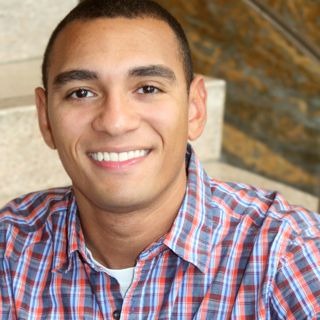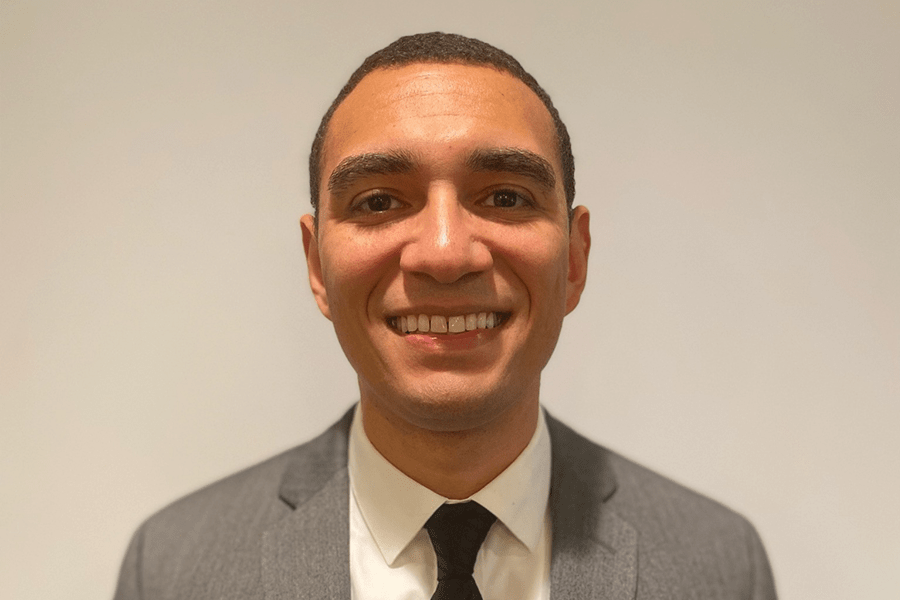Q&A WITH JONATHAN WHITTED OF FRIENDSHIP PLACE IN WASHINGTON, D.C.
“Ilove doing this work — every bit of this work,” says Jonathan Whitted.
Whitted is the Division Director for the Supportive Services for Veteran Families (SSVF) program at Friendship Place, a housing service provider for people experiencing homelessness in the Washington, D.C., region. The nonprofit organization aims to empower participants to rebuild their lives, find homes, get jobs, and reconnect with friends, family, and the community. Friendship Place has multiple programs, including a short-term housing facility for families, another for individuals and couples, a drop-in center, and various programs for veteran employment, permanent supportive housing, and SSVF.
He has been at Friendship Place for 11 years, starting out as a program case manager for permanent supportive housing and moving to his director role three years ago. With his background in mental health case management and crisis management, Whitted supports his team’s Built for Zero efforts through coordinated entry and by-name data management.
“I always stress the importance of working on our goals in order to make sure that we’re keeping up with our end of helping the community reach its overall goal of effectively ending veteran homelessness,” he said.
Read on to learn more about Whitted’s perspective on developing innovative and inclusive teams, involving the community in these efforts, and finding ways to cover a client’s “yes.”
How is your community working to make your homeless response system more racially equitable?
Currently, most people we serve in the D.C. Metro area represent the Black or African-American community. It’s good to always be cognizant of the folks you’re serving and the challenges they may have gone through and to have an understanding of the historical context as well. One of the biggest things is also always having representation of different demographics — especially of the folks that you’re serving — within leadership roles.
As an African-American male, it’s important for me that when we discuss the challenges the folks have faced in this system in this community, I’m able to have real conversations about the historical context of what different individuals who look like me have gone through.
The conversations within the higher-level meetings are important. Having representation is important, as is having data to back up the strategy or the reason for the strategy. These services need to be equitable for everyone.
Can you share any innovative strategies or best practices your organization has implemented to address systemic barriers to housing?
We had an LGBTQ+ fund that we were using for folks who were experiencing homelessness that represented that community. And once again, this was looking at the data and having that context of folks that could have barriers to accessing housing stability. We also recently connected with another private funder who was very interested in our work with the LGBTQ+ community, so they designated a certain amount of funds just for LGBTQ+ veterans. So, we did more of an intensive look at some of the needs there.
We’re having these conversations about who we’re serving. We’re also asking ourselves: “Is there anything that we’re actually missing? Is there some way that we need to be more targeted in our efforts?”

“We’re having these conversations about who we’re serving. We’re also asking ourselves: ‘Is there anything that we’re actually missing? Is there some way that we need to be more targeted in our efforts?’”
— Jonathan Whitted
How do you ensure a diverse and empowered team within your organization?
We care about representation. We hire folks who are veterans with lived experience. One of our core values is inclusion, diversity, equity, and collaboration. We promote, teach, and discuss it with all our new hires, even during the hiring process. And I think this is something that has attracted different people from all different backgrounds to actually work with us. Once again, if you have folks from different backgrounds working with you, you are definitely more equipped to then serve such a diverse population in the community.
We give people opportunities to take on different parts of the work. In some organizations I have been at, I was only considered the case manager, and I couldn’t move up. I couldn’t have any other responsibilities unless I had been there a very long time or had a certain degree or a license.
Then I came to Friendship Place, and automatically, they saw the work that I was doing and trusted me with more responsibilities. It was great. I was able to grow and develop. And that’s the same thing that we do to this day. We give people the opportunity to grow and take on different tasks.

What specific insight have you gained that has shaped your approach to solving homelessness and promoting racial equity?
“When working with some clients, you’ll often think to yourself, ‘If I were in this situation, could I have excelled as well as they have? This person’s so resourceful.’”
JONATHAN WHITTED
You’re always a leader, even if you don’t supervise or are not responsible for anyone else’s work. You’re still being a leader because you’re taking charge of your responsibilities, and you’re taking on your goal to do your part in contributing to this work to ending homelessness.
You may not even know you’re being a leader because it comes in so many different ways. For example, you could be working with a client and they’ve never rented a home before. They’ve never done this, but you took it for granted. This person’s 30 years old — clearly, they’ve done this. But no, they haven’t. So thinking about — I need to help this person set up their gas or electric account. Thinking of those things — you’re being a leader.
An “aha moment” for me is talking to so many talented folks who are doing the work and also talking to so many folks who are experiencing these situations and seeing the brilliance in them, too. When working with some clients, you’ll often think to yourself, “If I were in this situation, could I have excelled as well as they have? This person’s so resourceful.”
You always have to stay learning. Things are always changing. Everyone’s teaching you something. You should always take that in and stay innovative so that you can be the best for the people you’re serving.
What is your vision for the future of homeless response systems, particularly regarding racial equity?
During the pandemic, when you saw the situation that happened with the murder of George Floyd, I think that really changed the mindsets of a lot of folks. I had many different conversations with people that I had never had before. There was a lot of power in that. And it’s like — what do you do with that?
I think we’re still trying to figure it out as a nation. You’ve seen a lot of battles within our politics or education system, and how people are still grappling with it. You had this huge heinous act that happened — what do you do with that aftermath?
Everyone has to be mindful of those things because this isn’t just the Black community but other people of color. This is the Native American community and the Latino population as well. What have services looked like for them, given the oppression they have faced? We now have a responsibility — we have seen what is happening. We need to have these conversations. We need to be better advocates, and we need to be more equipped. We need to be listening to folks.
And I would love to see more representation of people with lived experience — those in our community right now — and that they actually are at the table. They’re able to make these decisions, too. And they’re able to talk about the challenges and the needs. I think agencies need to uplift those folks. I’d love to see more of that, and I love to see that more in this community. And make sure that funding and resources are available for different demographics in the community.
How can others, including the broader community, support this vision?
The general public often has stereotypical views, which are sometimes rooted in their own prejudices. The discrimination that has entered our education systems and media creates false understandings of what people go through and what types of people are experiencing these situations.
Advocacy is great. Education is great. Opening up to the community and having these conversations is great. Our organization has these webinars available for people across our community, where the leaders from other programs can actually talk to folks and answer some questions. We usually get specific questions about services we offer, who’s affected, and how they can be more involved.
So we’re constantly finding ways to ensure that we’re reaching out to the folks, having those conversations, and talking about our successes — and what that looks like in the future. The more you can put yourself out there and talk, the better.
Is there anything else you would like to share?
The organization and the team that I’m working with currently are fantastic. I’ve never worked for a nonprofit that is this compassionate about the folks it serves and has built all its services around how we can be more supportive of the population.
It’s your staff development, support, innovation, diversity, and inclusion. The team that I have is great. I think my staff does amazing work. I see them all supporting each other in great ways, thinking creatively, and having compassion for folks.
So, if someone asks something you can’t do contractually, find something you can do that actually still covers the “yes” in that. Meeting people where they’re at is another huge thing with Friendship Place. This has created a force of people who care about this work and feel they have the tools to do it.
That’s what this work is — you’re not in it alone. It takes us working together as a community and nation to finally end this crisis. I think that should always be in folks’ minds. It’s the bigger picture of why you’re doing these things.








